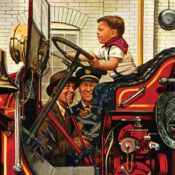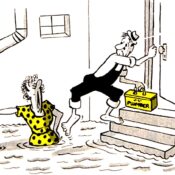Just as we were settling into winter, the National Oceanic and Atmospheric Administration reported on the dangers awaiting us because of climate change. I read a synopsis of the report, which warned of an increase in cataclysmic storms, the dying off of certain animals, the prevalence of drought, and the risk to agriculture, all of which alarmed me. What the report failed to mention was how sayings I once depended upon are no longer true. April showers no longer bring May flowers. Now the showers come in March and the flowers show up in April, a month early. Not that I’m complaining.
Despite the early arrival of spring, I long for the days before climate change, when people respected science regardless of their political or religious affiliation. When I was a kid, I not only respected science, I feared it, primarily because of the man who taught it, Russel Kirts, and his unswerving devotion to truth and discipline. I heard about Mr. Kirts long before I met him — stories of smart-alecky teenage boys who had talked back to him and were never seen again, not that anyone objected, since this was in the old days when people just shook their heads and said of the newly deceased, “Well, you can’t say they didn’t have it coming.”
It would never have occurred to Mr. Kirts, or his students, to reject science because of one’s political or religious views. If certain students harbored doubts about evolution or Earth’s age, they had the good sense not to say so in Mr. Kirts’ presence. Even though I was a poor pupil, I got along fine with him, largely because of my limited vocabulary, which consisted of two phrases: “Yes, sir” and “No, sir.”
When he wasn’t preaching the wonders of science, Mr. Kirts farmed. As fine a teacher as he was, one sensed he preferred the farm, the fresh earth turned by the plow, the nuzzle of the horse, the snort of the pig. The occasional flake of manure could be spotted on his shoes, a clue his workday hadn’t started in the classroom, but in the barn. He was stout as that barn, with a bull neck and a buzz cut. In my senior year, a story circulated that he had been seen smiling, but alas, it was just a rumor and couldn’t be verified. Nevertheless, I liked Mr. Kirts, who returned to each student the same measure of devotion the student gave him. I was a slow learner, but persistent, so Mr. Kirts stuck with me, guiding me through the dense thicket of chemistry and physics.
Because I respected Mr. Kirts and his gospel, I have little patience for the casual dismissal of science so common these days, mostly by people who wouldn’t have stood a chance in Mr. Kirts’ classroom and therefore don’t know the difference between a neutron and a neuron. Unfortunately, this has not kept them from trumpeting their pre-Enlightenment worldview, which might be good for their pocketbook but bad for the rest of us. Mr. Kirts, who like all farmers knew the earth and her rhythms as intimately as a lover knows his beloved, would have seen something amiss in April flowers and would have faced the matter as clearly and directly as he did an obstinate bull.
Mr. Kirts is gone now, but I’d like to think his passion and message endure — to understand this wondrous blue ball we call home, to know her proper cadence, and to remember that when she is well, so are we.
This article is featured in the March/April 2019 issue of The Saturday Evening Post. Subscribe to the magazine for more art, inspiring stories, fiction, humor, and features from our archives.
Featured image credit: Shutterstock
Become a Saturday Evening Post member and enjoy unlimited access. Subscribe now



